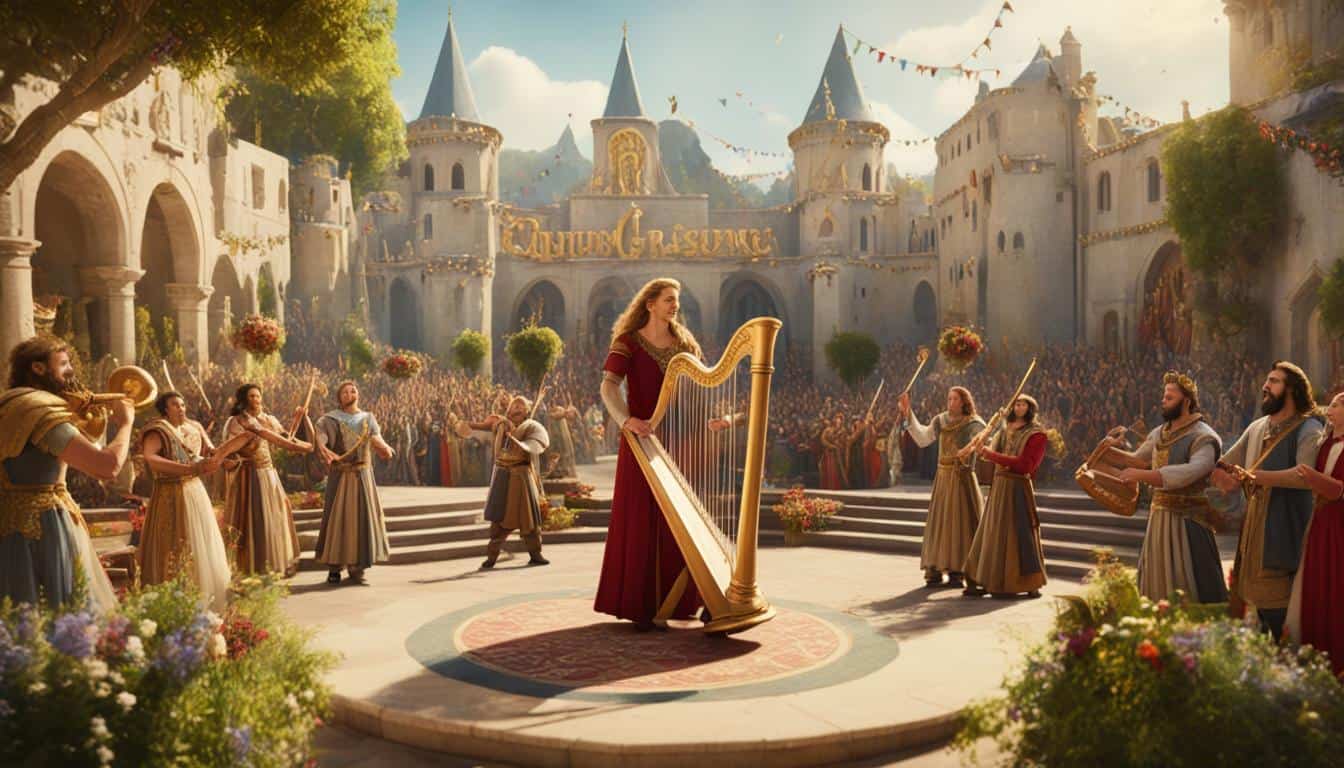Table of Contents
The Bible isn’t just a sacred book. It’s also a record of history, culture, and art. It shows us different parts of society, like the important role of music. In ancient times, musicians were key in worship, sad times, happy moments, and even in telling the future. Ready to explore how music was used back then?
In this article, we’ll look at various musicians in the Bible and see what they did. We’ll talk about those who played in temples, singers who mourned, musicians who entertained kings, those who played at parties, and even people who used music to make prophecies.
This will be a journey that deepens your knowledge of music’s role in biblical stories. And, it’s a treasure trove of our cultural past. So, get ready for an eye-opening experience.
Temple Musicians: Serving in Worship
In Bible times, temple musicians, called levites, were key in Israelites’ worship. They provided music for sacrifices and ceremonies at the temple.
They knew how crucial music was for a holy feeling. Their music made the ceremonies more beautiful and holy.
The harp, as in 1 Chronicles 15:16, was a key instrument. Its sound filled the temple, making worshipers feel uplifted.
Levites also used the trumpet, mentioned in Numbers 10:8. Its sound marked special parts of the ceremonies, grabbing everyone’s attention.
Temple musicians connected people with God through their music. It deepened worshipers’ feelings of love and respect for the divine.
Their music made the atmosphere great for people to think deeply about their spirituality.
Now, we’ll look at lamentation singers in the Bible. They were important for grief ceremonies.
Lamentation Singers: Mourning for the Departed
In the past, music was not just for happy times. It was also important at funerals. Lamentation singers were professionals who sang sad songs for the dead.
They were skilled in singing dirges, which are songs of mourning. These songs deepened the expression of grief at funerals. They helped people cope with the pain of loss.
Funerals were solemn and meaningful occasions back then. Lamentation singers made them even more so. Their songs united the community in grief. It was a way to honor the dead together.
Lamentation singers were highly respected for their skills. Their songs were a way to let out feelings of sorrow. They brought comfort to those who were suffering from a loss.
They played a big role in both personal and collective grieving. Their presence at funerals symbolized community support. They brought empathy to the mourners through their songs.
“Music goes beyond language. Lamentation singers are essential at funerals. They express everyone’s sorrow and offer comfort.”
Music, especially from lamentation singers, can deeply touch our hearts. Their mournful songs help us heal and come together. They’re a powerful force in easing the pain of loss.
The Role of Lamentation Singers
Lamentation singers, as professionals, sang sad songs at funerals. They allowed people to share their grief together. Their music made mourning a shared experience.
They were masters at singing sorrowful songs. Thanks to their talent, they could express deep sadness. This made the grieving process more meaningful for everyone.
Their dirges created a space for collective sadness. They reminded us that grief is part of being human. Their music was a way to share and express this universal feeling.
Thinking about the way lamentation singers worked in the past teaches us a lot. Their role was about helping people mourn together. They used their songs to express the sorrow that words sometimes can’t.

Royal Musicians: Entertaining the Kings
In ancient times, music was key to entertaining and making events special for kings. They invited skilled musicians to play at their gatherings and feasts. King David, known for his musical gifts and writing, always had a harpist with him. This shows how important music was in the old royal courts.
Royal musicians made every event grand and fitting for a king. Their music not only pleased the kings but also lifted everyone’s spirit. They helped to create a joyful and beautiful atmosphere. Their talent added to the feelings of the events, making them more special.
Importance of Royal Musicians
Royal musicians weren’t just there for entertainment. They were also a key way for the king to share emotions and stories with their people. Their music connected everyone at the event.
Having skilled musicians made the king look even more powerful and elegant. They weren’t just for show. They showed the wealth and sophistication of the king wherever they played.
Role in Elevating the Atmosphere
These musicians could turn any event into something magical. Their melodies and tunes could make you feel happy, amazed, or even moved. It depended on what the event was about.
“The skillful performances of the royal musicians transported the audience to a realm of heightened emotions, where they could temporarily escape the mundane and experience the grandeur of the moment.” – Music Historian
Royal musicians, with their amazing talent, set the mood for the whole gathering. They left a strong impression on everyone. Their performances made every event unforgettable.
Legacy of Royal Musicians
The effect of royal musicians isn’t limited to the past. They shaped the music and entertainment world that we know today. Their legacy lives on, inspiring modern musicians and performers.
| Legacy of Royal Musicians | Examples |
|---|---|
| Evolution of musical styles and genres | Classical musicians of the royal courts |
| Musical traditions and compositions | National anthems and royal anthems |
| Influence on performance techniques | Conducting and orchestration |
| Inspiration for contemporary entertainers | Musicians, singers, and dancers |
Festival Musicians: Celebrating with Music
Music has always been key at festivals, uniting people in joyful times. Festival musicians create a happy, communal vibe with their catchy tunes and beats.
The festival air is filled with music as crowds mark various cultural and religious events. Instruments like timbrels (or drums) play lively rhythms, encouraging everyone to sing and dance. This adds a boost of fun and energy to the celebrations.
Timbrels have entertained festival crowds for ages, with their captivating beats. These handheld drums, often played with bare hands or tambourines, symbolize lively festivals. They get everyone to clap and dance, following the beats of their joyous traditions.
Lyres are another popular festival instrument. Festival musicians skillfully play this stringed instrument, creating enchanting melodies. This adds an elegant touch to the celebrations, touching the soul of those present.
The harmonious melodies of festival musicians turn events into joyous, united celebrations. They spread happiness through their music.
Festivals have always been about sharing different cultural and customs. Music is a universal language that brings people from all walks of life together. It unites them in celebrating the beauty of life together.
So, next time, notice the music at a festival. Let the sounds of timbrels and lyres whisk you away into a world of fun and celebration.

| Festival Musicians | Instruments |
|---|---|
| Folk Festivals | Timbrels, Lyres, Flutes |
| Religious Festivals | Timbrels, Horns, Harps |
| Cultural Festivals | Timbrels, Drums, Guitars |
This table showcases the wide variety of festival musicians and their typical instruments. It’s incredible to see the different instruments for various cultural and religious events.
Prophetic Musicians: Music in Prophecy
The Bible teaches us that music is important in prophecy. Prophets, known for their special insights and messages from God, often had musicians with them. This special mix of music and prophetic words created a spiritual setting. It made the divine messages clearer and more moving.
In 1 Samuel 10:5, we see King Saul with a harp player before his prophetic moment. The music from the harp made his message more engaging. It also helped the audience get ready to hear God’s sacred words.
People think the sound from harps and other instruments boosted the power of prophetic words. This joint effort of music and prophecy touched the hearts of both the prophets and those listening. It was a perfect way to share God’s divine messages and advice with everyone there.




